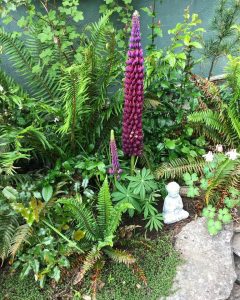
As the weather warms up, many of us spend more time outside in our yards and gardens.
This is especially true now, as we practice physical distancing by staying home to minimize the spread of COVID-19.
Since most of our Spring maintenance work is on hold for for now, we wanted to share some tips that you can do right now to help transition your garden to thrive with less maintenance.
- Add Mulch
Just as we’re embracing Spring and becoming more active, so too are the important critters in your garden soil. These organisms – decomposers, insects, and helpful microorganisms – help your plants grow healthy and strong. And as they wake up after a long winter, they’re hungry!
One of the things we can do to make sure these creatures are fed well is to add a layer of mulch to our garden beds. Spring is a great time to do this work.
Good mulch feeds everything that’s alive in the soil. it also helps to reduce weeds, trap moisture in the soil during the summer and guard against soil compaction.
All of these benefits directly reduce the amount of maintenance we need to do in our garden. Fewer weeds means less time weeding; more moisture means less time watering and lower water costs and; reduced soil compaction means more oxygen in the soil, which leads to healthier soil life and plants with fewer pests and diseases.
Mulch can come in various forms, some of which are more beneficial than others. Depending on your primary goal (which we think should be building healthy soil!), you will want to find a mulch that is high in organic matter.
Examples of mulch include:
- Compost, fish/sea soil, leaf mulch, or composted manures are high in organic matter. These contain valuable soil nutrients and healthy soil microorganisms that actually help deliver the nutrients to your plants. Tip: Use leaves from the trees and shrubs on your property as a local source of organic leaf mulch!
Photo by Kelsey Cramer
- Bark mulch is another type of organic mulch that will decompose in time. Though it does not deliver nutrients as well as compost, it’s great for stopping weeds and keeping in moisture.Tip: Many local suppliers will let you bring your own bucket, garbage can or tote to purchase small amounts
- Some mulch, such as gravels or cobbles, can lessen weeds initially but will not provide any nutrient value and may even increase soil compaction..
If you are striving for lower maintenance in the long-run, we highly recommend going with an organic composted mulch, applied at about a 2” depth, for the best garden results.
- Plant More Plants
The other springtime activity that can lead to lower garden maintenance over time is to plant more plants! In the healthiest, lowest maintenance West Coast gardens – our forests and natural areas – plants grow close to one another. Leaf mulch fills in the gaps and there are very few ‘weedy’ plants. We can copy nature in our own gardens by filling in all the gaps with plants.
Photo by Lindsey Haist
For this to be effective in your garden, it is key to think in layers. Groundcovers including perennials do wonders for weed suppression. Young plants need light and it’s pretty hard for newly sprouted seeds to get enough light to grow through a thick groundcover.
Tip: One of our favourite ground covers for sunny, hot areas is creeping thyme (wooly thyme or Elfin thyme are both common in local nurseries). If you’re looking for a ground cover, these can be planted in between all your other plants to fill the gaps.
Photo by Lindsey Haist
Shrubs and trees are the next layers to consider. Just like some of the benefits from a good layer of mulch, shrubs and trees can provide the same benefits:
- Free mulch. As leaves and branches drop, leave them in place or rake them into your garden beds. This will provide a natural mulch that will benefit the soil and possibly save hours of work!
Tip: for a tidier look remove larger debris and create defined borders around the beds.
- Shade. Trees and shrubs cast shade, which can help keep the soil cool and moist since less water will be lost to evaporation.
- Healthy soil. Finally, as trees and shrubs grow, their roots search out nutrients. As roots grow they push soil around, which helps reduce compaction by keeping it loose, oxygenated and welcoming for the beneficial soil life that we should all be trying to take care of.
Tip: If you are unsure what plants to choose, repeat plants that are already doing well in your garden.
So, if you find yourself with a little extra energy and time as the weather is warming up this spring, why not think about mulching and planting in your garden!
Not only does mulching and planting densely create a lush and beautiful space, it also improves garden health and reduces maintenance needs so you will have more time to enjoy it all.
If you are looking for mulch, plants or other gardening materials, many local nurseries remain open. Some also offer delivery services. Call your local nursery directly to find out more.
Written by Kelsey Cramer & Lindsey Haist
ALDER Environmental is a Nanaimo based landscaping company offering design, installation and maintenance services. ALDER specializes in creating low-maintenance landscapes that celebrate the natural beauty of West Coast. They are experts in creating eye-catching spaces that also have a positive impact on the natural world by restoring habitat, embracing biodiversity and supporting pollinators.
Feel free to ask any landscaping or gardening questions via our contact form below.
